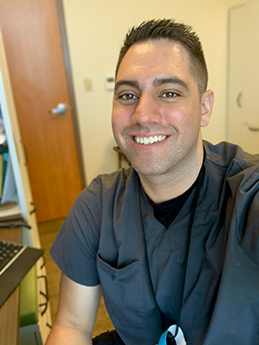
Steven Sasa Marsiglia is a doctoral student in the counseling psychology program at Arizona State University who received his M.S.Ed. in education, culture, and society and his M.A. in counseling psychology. He is a traditional Doctoral-level Mental Health and Substance Abuse Services (MHSAS) Minority Fellowship Program (MFP) fellow with the American Psychological Association (APA) with an anticipated graduation date of May 2023.
Steven was initially drawn to the MFP because of the lack of representation of Native Hawaiians and Pacific Islanders (NHPI) in mental health research and behavioral health services. He shared, "I was especially interested in the policy training that MFP offers, because policy in particular has had huge implications for the representation of NHPI in behavioral health statistics and federal data."
When reflecting on how the MFP has enriched his academic and professional career, Steven shared that it provides him space to have a voice as well as a community of students and mentors that understand the experiences of minoritized doctoral students. He explained, "Graduate programs in psychology still focus heavily on Eurocentric perspectives of health. MFP is an avenue for students of color to connect with and learn from other scholars of color." Currently, Steven is working with his MFP mentor to develop a manuscript on how settler colonialism of the Pacific Islands and race misclassification through the U.S. Census have fundamentally caused health and social inequities for NHPIs. He shared, "With MFP mentorship, I hope to publish research focusing on the decolonization of psychology and move away from popular contemporary frameworks that skew towards universality of psychological treatments and methodologies. Furthermore, I hope to continue to highlight the importance of Indigenous data sovereignty, self-determination, and disaggregation for my community, in order to resist psychology's compliance in the systemic erasure of Native populations."
Upon completion of the MFP, Steven hopes to work in a community health-oriented setting as a clinician serving Indigenous populations and communities of color. He plans to ethically incorporate the skills and knowledge acquired through the MFP into the fields of behavioral health, health psychology, and community psychology to become a competent health professional. He shared, "I hope to contribute to educating incoming generations of health professionals to adequately service NHPI and Indigenous populations through continued research and clinical praxis." While interviewing for doctoral programs, a professor at a prestigious private university made an offhanded comment about Pacific Islander parents. This interaction was further confirmation for Steven that representation of NHPI practitioners is imperative. He shared, "Stereotypes of Native populations abound, even at the highest levels of academia – these historical and ongoing legacies of trauma and oppression need to be unlearned so that future generations can thrive and heal."
When asked if he had any advice for anyone thinking about applying to the MFP, Steven said, "The MFP is an amazing program and resource for doctoral students. It helps to believe in your vision of change for your field, even if it seems beyond the scope of what is currently capable. The psychology field has come a long way from racist practices like phrenology and using intellectual assessment to blatantly categorize BIPOC communities as inherently less intelligent, and yet, we also have such a long way to go in so many ways. Sharing your vision and passion with MFP is a great way to showcase your goals not just as a student but as a future professional and clinician."
In closing, Steven has this to share, "The APA MHSAS fellowship has been a pivotal program in my training and development as a student. With the community and support it has provided, I feel validated in my purpose and goals as a doctoral student. Culturally, I feel that as an Indigenous student the weight of my family, my community, and my ancestors are all weighing heavily on my shoulders. I learned very recently of a Samoan proverb that speaks to how I feel, "O le tele o sulu, e maua ai figota" is a fishing analogy that translates to: The more torches there are, the greater the light, which brings a more abundant catch. I am so appreciative of MFP helping me carry my torch, and hope that MFP will continue supporting Native students to light the way for others to join the health professions and heal our communities, together."